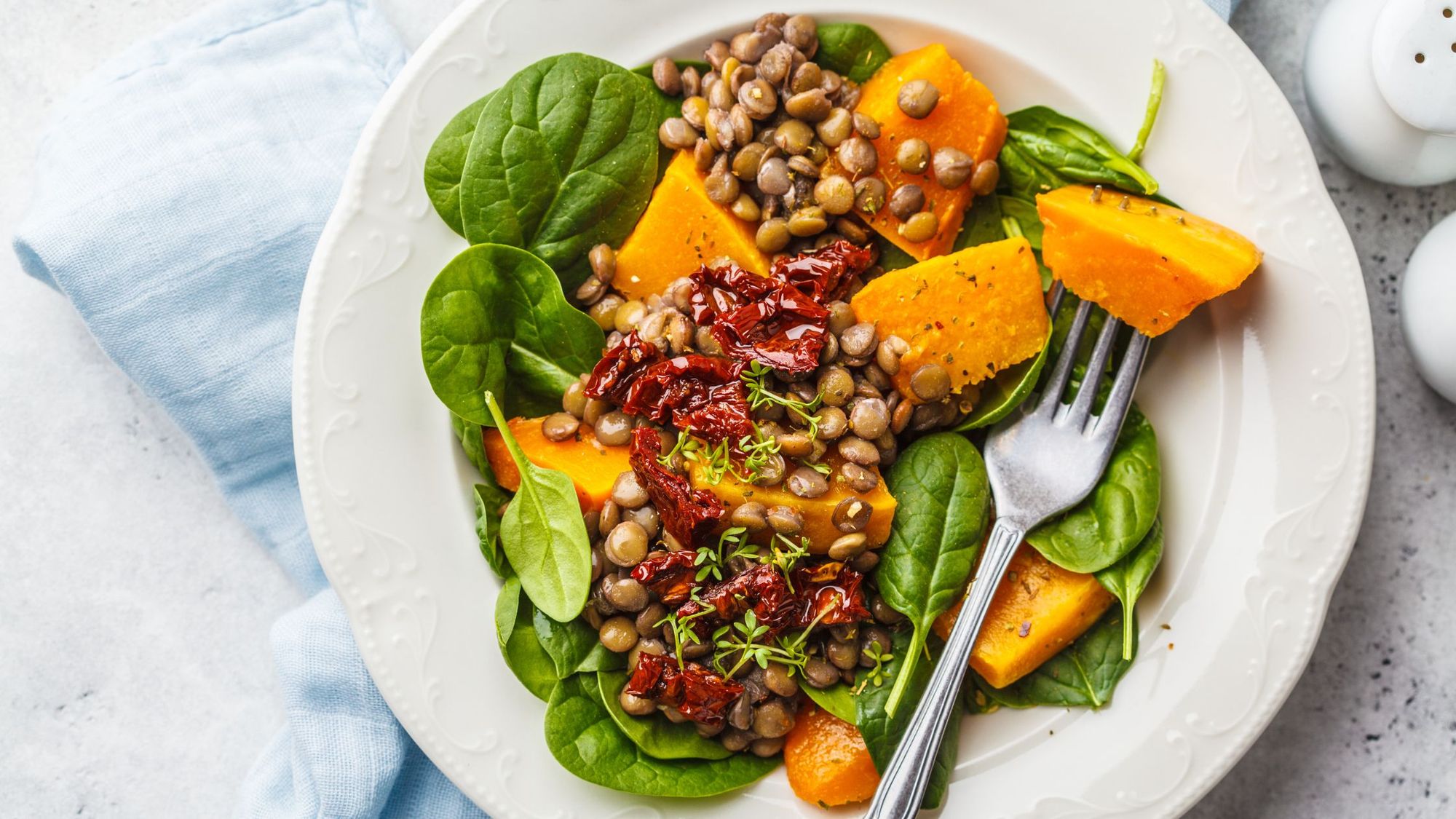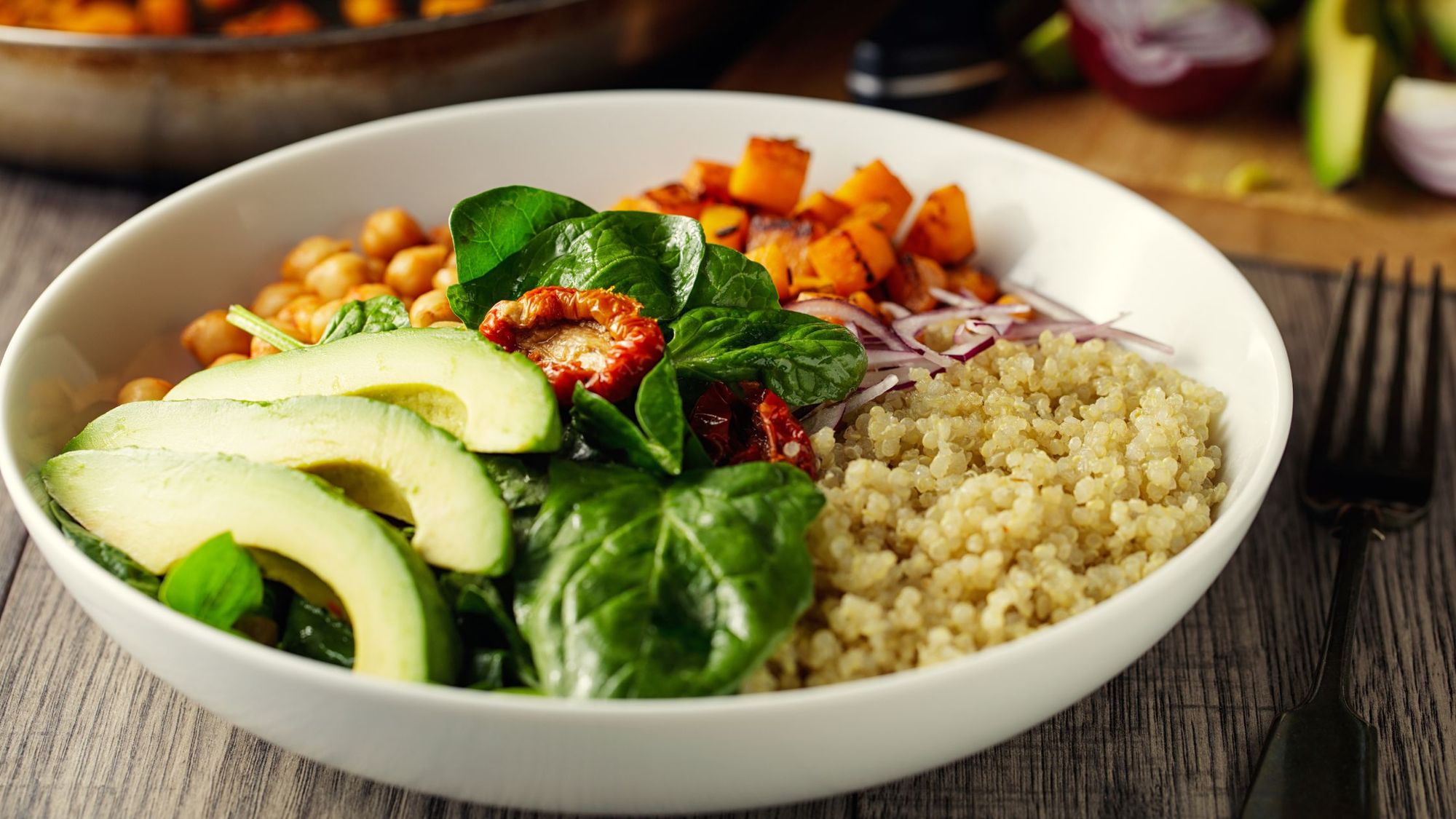
Is being vegan always healthy? Not necessarily, especially since there is such a wide variety of foods that vegans can eat.
There are many different reasons why someone might choose to follow a vegan diet. Some vegans are ethical vegans who follow this diet for the purposes of animal rights, and the question of is being vegan healthy isn’t their primary concern. Some opt for veganism as a way of protecting the planet from the impacts of animal agriculture. Others dislike the taste and texture of meat. There are also people who simply enjoy vegan food and believe in the health benefits of a plant-based diet.
However, one of the most common reasons people choose veganism is because they genuinely believe that veganism is a healthier option than a traditional western diet. Around 17% of vegans say they chose their lifestyle to become healthier.
On the surface, veganism does seem to be a healthy choice. When you cut down on animal-based foods, you also reduce your intake of processed meats and red meats, which are frequently linked to several chronic illnesses. You also increase your consumption of nutritious plant-based foods, rich in vitamins, minerals, and enzymes crucial for good health.
However, being vegan doesn’t automatically mean you’ll be eating healthy. The quality of the vegan food you eat plays a significant role in how healthy you’re likely to be. Similar to other dishes, vegan foods can also be rich in saturated fats, sugars, salts, and simple carbs.

Is Being Vegan Healthy? An introduction
So, is being vegan healthy? A lot of research indicates a vegan diet can have positive effects on your health, from reducing the risk of cardiovascular disease and diabetes, to encouraging weight loss. However, some studies also indicate that vegan diets can be problematic.
While a vegan diet is high in fiber and lower in dangerous substances such as cholesterol in most cases, it can also lack essential nutrients. The absence of eggs, meat, and dairy in your diet could mean you struggle to get the right amount of protein to build strong muscles and bones. Vegan diets are also low in vitamin B12, a vital nutrient which plays an essential role in the functioning of the nervous system, and the production of red blood cells.
However, vegans can take vitamin supplements and eat fortified foods to reduce their risk of nutritional deficiencies in many cases. Perhaps the biggest challenge most vegans face, comes from the fact many believe a vegan diet is automatically healthier than other diets. This assumption often means many people fail to consider the additives and ingredients of certain vegan foods.
In one Harvard study, researchers found that people who adhered to vegan diets did have a substantially lower risk of heart disease than their counterparts. However, the report also found eliminating meat doesn’t necessarily lead to better health, particularly if people continue to eat high amounts of processed or artificially sweetened ingredients on a vegan diet.
Similarly, another study found that people consuming a vegan diet which included a lot of processed foods, such as sugary beverages, were more likely to suffer from heart disease than those who avoided processed ingredients, but still ate meat.

Why Vegan Dishes Aren’t Always Healthier
There are various reasons why the answer to: Is being vegan healthy? Might actually be, “No”. Even though vegans have access to protein and other macronutrients in plant-based forms, many of the plant-based foods they consume lack crucial amino acids. For instance, a protein diet made up of beans and lentils may not provide the right balance of amino acids to support human growth.
Plant-based protein sources also generally contain non-haem iron, which is not absorbed by the body as well as animal-based sources of iron. This could be part of the reason why 25% of vegans in one study had low iron levels, compared to 0% of the study’s participants who were omnivores.
Furthermore, many vegan foods aren’t as healthy as they appear. While they may include more plant-based vitamins and minerals, they can also feature additional carbs, sugars, and chemicals.
Some common culprits of unhealthy vegan diets include:
Vegan Meat Alternatives
Meat alternatives, or plant-based proteins used in vegan diets, can seem healthy on the surface, but lack a lot of essential nutrients. One popular alternative to meat is Jackfruit, which has a meat-like texture many vegans enjoy. However, jackfruit contains very little protein, and a lot of carbohydrates, which could be a problem for those who want to lose weight.
Vegan deli meats are another source of concern. They’re processed in a similar way to standard animal products, which means they often contain a high amount of sodium, which can increase your risk of various heart conditions, as well as chronic inflammation.
Even seitan, made from wheat gluten, can sometimes contain large amounts of salt and sugar, which can damage an otherwise healthy diet.
Vegan Fast Foods
Many people assume choosing a vegan version of a fast-food product such as a vegan burger or hotdog is the healthier choice. However, if we dive a little deeper into the question “Is being vegan healthy?” We discover many commercially-produced fast foods for vegans are loaded with processed components and preservatives.
A vegan burger in the UK from KFC, for instance, contains around 2.91g of salt, compared to only 2.02g for the standard fillet burger. Many imitation hotdogs and burgers also include processed soy, excess sugar, and artificial flavours.
Most processed foods designed for vegans can be just as problematic for your health as processed meat products. They generally include large amounts of hydrogenated and trans fats, as well as emulsifiers and binding products which can lead to increased inflammation.
Vegan Cheese and Dairy Products
Many milk alternatives and other non-dairy products designed for vegans do include a lot of good ingredients, such as healthy fats and calcium. But they’re not always as healthy as they appear. Coconut oil is a common ingredient for fats in vegan cheese alternatives, as well as palm oil. Unfortunately, coconut oil is high in saturated fats, which can increase your levels of LDL cholesterol.
Yogurts and some vegan milk drinks have the same downsides: they’re high in coconut oils, added sugar is very common, and in many cases, can include significant amounts of fat taken from plant sources. Yogurts sold for vegans can also include parfaits and granola-based items which feature large amounts of added sugar.
Vegan Snacks
Vegan snacks aren’t necessarily a healthier option either. A vegan smoothie is a great way to nourish yourself in the morning or after a workout, but it can contain a lot of calories. Smoothies high in fruit have a lot of vitamins and minerals to offer, but also include a lot of natural sugars.
Additives included in vegan smoothies, such as peanut butter, dates, cashews, hemp seeds, and bananas can deliver extra protein and nutrients, but they also contain a lot of calories. Even granola bars and energy bars, which seem better for your health than a standard candy bar, can still include large amounts of added sugar. You may also find artificial colors and flavorings listed on the label.
One commonly overlooked unhealthy snack in a vegan diet are vegan chips. Kale, sweet potato, and carrot chips might seem healthier, but they’re high in saturated fats and salt, similar to the potato alternative.
Vegan Sweets
Vegan desserts and sweets are also just as problematic as their non-vegan alternatives. Natural cereals such as oatmeal and grains can seem to be a great choice if you’re looking to stock up on fiber, but they can also include a significant amount of added sugar.
Vegan desserts can be problematic, even if they feature less sugar. When manufacturers remove eggs and butter from baked goods, cupcakes, and similar products, they often replace these substances with pectins, gums, and starches to create a similar texture.
Studies have found that these substances can increase your cholesterol levels, and lead to higher instances of inflammation, which can contribute to chronic diseases.
High Carb Vegan Meals
Many vegan meals are very high in carbohydrates, since vegans often enjoy making vegan rice bowls, pastas, and vegan burgers.
Vegans who are trying to be healthier might want to research low-carb vegan meal ideas.
Veganism Can be Healthy: But it’s Not Always Healthier Than Other Diets
So, back to the question, is being vegan healthy? It all depends on how you manage your diet. In general, vegan diets can be extremely nutritious, as they’re high in plant-based foods which are rich in crucial enzymes, minerals, vitamins, and fiber. Research links vegan diets to a lower risk of high blood pressure, cholesterol, and heart disease.
Vegan diets are also more likely to be low in saturated fat, and high in folate, magnesium, and unsaturated fats. Nuts, wholegrains, and legumes, staples of the vegan diet, all have excellent benefits to offer. Plus, vegans are more likely to have a lower body mass index, thanks to high-fiber and filling food choices, which reduces the risk of overeating.
Despite this, it’s important to remember that vegan diets aren’t always healthier than non-vegan diets. Just as with any diet, you’ll need to ensure you’re watching out for added chemicals, sugars, salts, and preservatives if you want to keep eating healthy, as well as limiting carb intake.
It’s also worth making sure your vegan diet doesn’t lead to any deficiencies in crucial macro and micronutrients that your body needs. Your CircleDNA test will tell you which foods you need more or less of, depending on your genetic makeup, so you can build your meal choices around your own personal requirements.
Resources:
- Soylent: Vegan Statistics 2023
https://soylent.com/pages/vegan-statistics/ - JACC: Healthful and Unhealthful Plant-Based Diets and the Risk of Coronary Heart Disease in U.S. Adults
https://www.jacc.org/doi/10.1016/j.jacc.2017.05.047 - NCBI: Plant-based diets and cardiovascular health
https://www.ncbi.nlm.nih.gov/pmc/articles/PMC6089671/ - NCBI: Nutrient intake and iron status of Australian male vegetarians
https://pubmed.ncbi.nlm.nih.gov/10201799/ - KFC: Vegan burger
https://www.kfc.co.uk/menu/vegan/original-recipe-vegan-burger - NCBI: Health effects of vegan diets
https://pubmed.ncbi.nlm.nih.gov/19279075/






